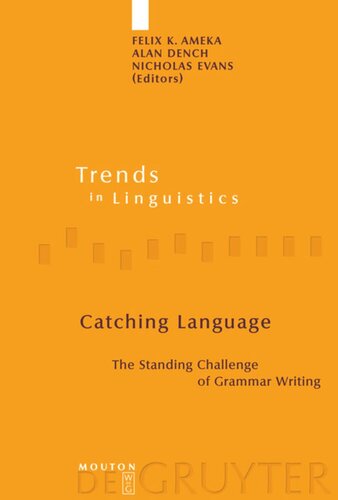

Most ebook files are in PDF format, so you can easily read them using various software such as Foxit Reader or directly on the Google Chrome browser.
Some ebook files are released by publishers in other formats such as .awz, .mobi, .epub, .fb2, etc. You may need to install specific software to read these formats on mobile/PC, such as Calibre.
Please read the tutorial at this link: https://ebookbell.com/faq
We offer FREE conversion to the popular formats you request; however, this may take some time. Therefore, right after payment, please email us, and we will try to provide the service as quickly as possible.
For some exceptional file formats or broken links (if any), please refrain from opening any disputes. Instead, email us first, and we will try to assist within a maximum of 6 hours.
EbookBell Team

4.4
32 reviewsDescriptive grammars are our main vehicle for documenting and analysing the linguistic structure of the world's 6,000 languages. They bring together, in one place, a coherent treatment of how the whole language works, and therefore form the primary source of information on a given language, consulted by a wide range of users: areal specialists, typologists, theoreticians of any part of language (syntax, morphology, phonology, historical linguistics etc.), and members of the speech communities concerned. The writing of a descriptive grammar is a major intellectual challenge, that calls on the grammarian to balance a respect for the language's distinctive genius with an awareness of how other languages work, to combine rigour with readability, to depict structural regularities while respecting a corpus of real material, and to represent something of the native speaker's competence while recognising the variation inherent in any speech community.
Despite a recent surge of awareness of the need to document little-known languages, there is no book that focusses on the manifold issues that face the author of a descriptive grammar. This volume brings together contributors who approach the problem from a range of angles. Most have written descriptive grammars themselves, but others represent different types of reader. Among the topics they address are: overall issues of grammar design, the complementary roles of outsider and native speaker grammarians, the balance between grammar and lexicon, cross-linguistic comparability, the role of explanation in grammatical description, the interplay of theory and a range of fieldwork methods in language description, the challenges of describing languages in their cultural and historical context, and the tensions between linguistic particularity, established practice of particular schools of linguistic description and the need for a universally commensurable analytic framework.
This book will renew the field of grammaticography, addressing a multiple readership of descriptive linguists, typologists, and formal linguists, by bringing together a range of distinguished practitioners from around the world to address these questions.